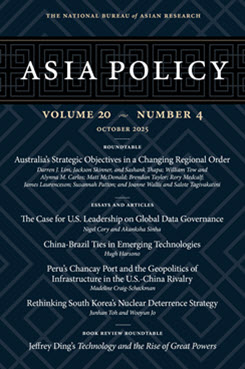Essay in Asia Policy 20.4
The Case for U.S. Leadership on Global Data Governance
Without a bold and credible U.S.-led strategy for global data governance, U.S. technological and economic leadership faces mounting risks from fragmented digital rules and rival regulatory models, including from China.
This is the second in a series of four essays in 2025–26 on trade policy made possible by the generous support of the Hinrich Foundation.
EXECUTIVE SUMMARY
MAIN ARGUMENT
Cross-border data flows are foundational to the technologies—cloud, software, search, social networks, and artificial intelligence—that demonstrate U.S. technology leadership. A U.S. technology strategy that fails to prioritize global data policy leaves U.S. firms and innovation exposed to rising digital protectionism and rival regulatory models, which undermine their market access and ability to set international standards. Existing global initiatives, such as the G-7’s Data Free Flow with Trust (DFFT), the OECD’s Declaration on Government Access to Personal Data Held by Private Sector Entities, the Global Cross-Border Privacy Rules (CBPR) Forum, and digital trade provisions in trade agreements, offer critical but partial building blocks. By building on and uniting these efforts, the U.S. can safeguard American innovation and technology leadership while also fostering innovation, trade, and trust with allies and trading partners.
POLICY IMPLICATIONS
- The Trump administration must build an agenda and coalition of like-minded partners for trusted data flows, such as via the Global CBPR Forum and the DFFT Initiative. The U.S. should use its diplomatic, economic, and technological leverage to bring more countries—especially key middle powers and emerging markets—into these initiatives, making participation a pillar of trade negotiations and technology cooperation.
- U.S. global data policy requires cooperation with allies and partners to prevent adversaries and untrustworthy actors from accessing sensitive data or controlling critical infrastructure. The U.S. should address national security and data privacy concerns in the cloud by working with partners to define “trusted” cloud providers and apply OECD principles for government data access. This approach would distinguish U.S. and allied providers from Chinese competitors on trust and security, while helping other countries assess cloud services on features beyond price.
- If the U.S. fails to lead on global data policy, divergent and protectionist regulations will continue to proliferate. This will create ever higher and costlier barriers to U.S. firms that otherwise depend on data flows and digital trade to access global markets. It will also undermine the international trust that is increasingly essential for digital commerce and innovation.
Nigel Cory is a Director at Crowell Global Advisors (United States), where he focuses on cross-border data flows, data governance, digital technologies, and how they each relate to digital trade and the governance of technology. He is also a Nonresident Fellow at the National Bureau of Asian Research.
Akanksha Sinha is a Senior Consultant at Crowell Global Advisors (Singapore). She has expertise in digital economy, emerging technology, and international trade, especially as they pertain to the Asia-Pacific.
About Asia Policy
Asia Policy is a peer-reviewed scholarly journal presenting policy-relevant academic research on the Asia-Pacific that draws clear and concise conclusions useful to today’s policymakers. Asia Policy is published quarterly in January, April, July, and October and accepts submissions on a rolling basis. Learn more


